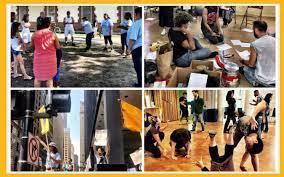
https://www.peoplepowered.org/events-content/conference-pedagogy-and-the...
https://ptoweb.org/gatherings/conference/
Pedagogy and Theatre of the Oppressed (PTO) is an international organization that supports people whose work challenges oppressive systems by promoting critical thinking and social justice through liberatory theater and popular education. Its approaches are based on the theories and practices of Paulo Freire and Augusto Boal.
This year’s conference will emphasize popular struggle and popular power, which are themes as relevant as ever now. By popular power, PTO means actions that are:
-
Powered by people who are often excluded from conferences like this one.
-
Focused on genuine equality and justice.
-
Organized to dismantle systems that benefit some people at the expense of others.
-
Waged against elitism, condescension, class division, capitalism, racism, White supremacy, coloniality and settler occupation, imperialism, nationalism and borders, fascism, austerity, privatization, patriarchy, heterosexism, gender norms, ageism, ableism, educational inequality, slavery, imprisonment, environmental destruction, and other forms of violence.
-
Taken collectively, built through movements or alliances (often hard, complicated, partial alliances) across barriers that have been built to keep people from fighting together.
-
Performed by, as Paulo Freire described, “people engaged in the fight for their own liberation.”
-
Reflective of Augusto Boal’s notion that, “[t]o be popular” is to “always tackle issues from the people’s perspective, that is, the perspective of permanent transformation, of anti-alienation, of struggle against exploitation.”










Add new comment